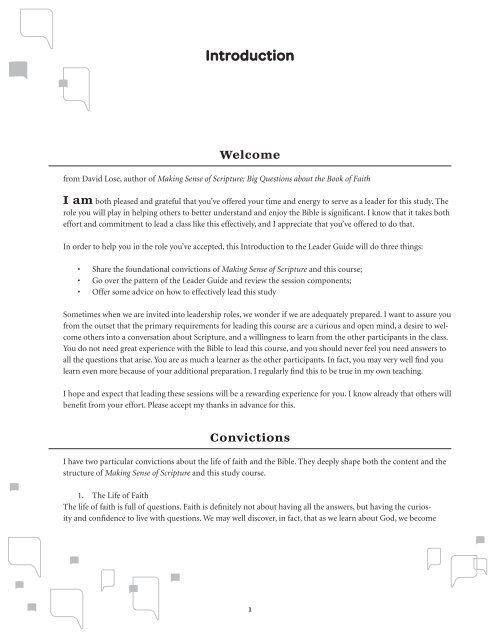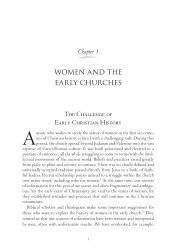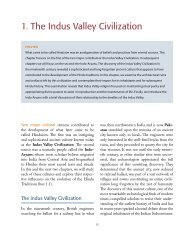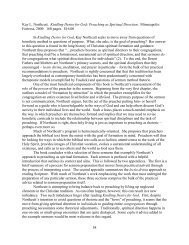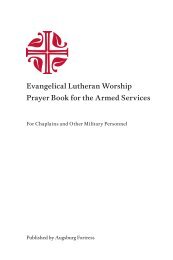Introduction - Augsburg Fortress
Introduction - Augsburg Fortress
Introduction - Augsburg Fortress
You also want an ePaper? Increase the reach of your titles
YUMPU automatically turns print PDFs into web optimized ePapers that Google loves.
<strong>Introduction</strong>Making Welcome Senseof Scripturefrom David Lose, author of Making Sense of Scripture: Big Questions about the Book of FaithMaking Making Sense SenseI am both pleased and grateful that you’ve offered your time and energy to serve as a leader for this study. Therole you will play in helping others to better understand and enjoy the Bible is significant. I know that it takes bothof of Scriptureeffort and commitment to lead a class like this effectively, and I appreciate that you’ve offered to do that.In order to help you in the role you’ve accepted, this <strong>Introduction</strong> to the Leader Guide will do three things:• Share the foundational convictions of Making Sense of Scripture and this course;• Go over the pattern of the Leader Guide and review the session components;• Offer some advice on how to effectively lead this studySometimes when we are invited into leadership roles, we wonder if we are adequately prepared. I want to assure youfrom the outset that the primary requirements Leader for leading Guidethis course are a curious and open mind, a desire to welcomeothers into a conversation about Scripture, and a willingness to learn from the other participants in the class.You do not need great experience with the Bible to lead this course, and you should never feel you need answers toall the questions that arise. You are as much a learner as the other participants. In fact, you may very well find youLeader Leader Guide Guidelearn even more because of your additional preparation. I regularly find this to be true in my own teaching.I hope and expect that leading these sessions will be a rewarding experience for you. I know already that others willbenefit from your effort. Please accept my thanks in advance for this.ConvictionsI have two particular convictions about the life of faith and the Bible. They deeply shape both the content and thestructure of Making Sense of Scripture and this study course.1. The Life of FaithThe life of faith is full of questions. Faith is definitely not about having all the answers, but having the curiosityand confidence to live with questions. We may well discover, in fact, that as we learn about God, we become1
Making Sense of Scripture LEADER GUIDEJoin the ConversationIn this section, participants will engage the central concepts and ideas of the chapter they’ve read in three ways.• Video <strong>Introduction</strong>—Provides a summary of the chapter and an overview of the exercises andBible study to come. If you choose not to show this, you will probably want to summarize thechapter concepts, drawing from the Chapter Overview (in the Prepare section).• Conversation Starters—Focuses on two quotations directly from Making Sense of Scripture thatcapture the main ideas of each chapter. These quotations are followed by several questions designedto elicit initial conversation about the topic at hand.• Activity—Gives participants a chance to put the concepts into practice, usually while workingtogether in small groups. Here, some of the conceptual learning takes a deeper, more experiential“hold” of the participants. Many sessions also offer a Bonus Activity that can be used in additionto or instead of the main activity, depending upon your group’s needs and the amount of timeyou have for the class session.Open ScriptureHaving “practiced” the concepts of the chapter during the Activity, this section engages participants in exploringBible texts to support the key concepts of the session.• Bible Text—Engages participants in Scripture using the new ideas and tools they developed duringJoin the Conversation. Through discussion and activities, participants deepen their understandingnot only of a biblical passage, but also of the main idea or skill covered in the chapter.Most sessions have a Bonus Activity with suggestions for exploring additional Bible passages.Extending the Conversation• Looking Back—Revisits the notes from “IQ” (Insights & Questions) Time collected at the beginningof the session. This is usually a good opportunity to affirm what has been learned andsometimes to sharpen questions that the participants will want to keep in mind going forward.• Looking Ahead—Previews the subject to be covered in the next chapter and session. You canshare the brief instructions provided to “prime the pump” before participants read the next chapterand prepare for the next session.Reproducible Session HandoutsThese are provided to you for each session in case you want the learners to have the questions that accompanythe activities of the study (Join the Conversation and Open Scripture). They also include the assignment for theupcoming session.Make the course your ownWhile the Conversation Starters, Activities, Bible Passages, and Bonus Activities are designed to reinforce and buildon each other, please feel free to tailor or adapt these pieces to fit the needs and goals of your group. For example,you may anticipate spending extra time on a particular Activity and decide to spend less time on the Bible Passage4
<strong>Introduction</strong>that week, or vice versa. The Leader Guide sessions are just that—guides with information and suggestions toequip you to lead and facilitate each week’s study. You are and remain the leader of this study, and you can andshould exercise your discretion in how to use the material provided. So after reading the Leader Guide, feel free tomake this course your own.Advice and CounselYou have everything you need to lead this course of study effectively. By reading through the book chapter andLeader Guide ahead of time and doing some minimal preparation you can be confident that you will facilitate arewarding and enjoyable learning session for your participants. Even so, here are several suggestions for enhancingthat experience.• Making Sense of Scripture is the main resource for each of the participants. The material in yourLeader Guide is provided only to you. It will help you summarize key points in the book, but theclass session will be enhanced if participants read from and engage the material directly fromtheir books.• Questions are central to this course. Throughout the course, remind people that there are nodumb questions, that we learn from the questions asked by ourselves and others, and that questionsare the mark of a curious and eager mind. You all have a great deal to teach and learn fromeach other; reminding participants of your confidence in this will help develop trust and supportamong the group.• Don’t be afraid of silence. The silence that comes immediately after you ask a question can beone of the most difficult things about leading a study. As the leader, you have been able to thinkthrough the questions ahead of time. Participants, however, may be encountering these questionsfor the first time. During the silence, they are formulating their answers, and what seems like avery long time to you probably does not seem that long to the participants. So allow the silencesto be “holy times” of contemplation rather than feeling the need to fill the quiet moments.• Pay attention to building relationships. As important as the session material may be, the relationshipsyou are developing with each other as you explore Scripture are even more important.Always make room for catching up and checking in with each other, and always allow time andspace for people to share their thoughts, questions, insights, and concerns. The time you spend inconversation and prayer will always be time well spent.• The Bible often produces strong emotions in people. Even those who have not read a Bible inyears may be surprised at how strong their opinions about the Bible are. Don’t be caught offguard if people in your group disagree about various aspects of the Bible or about the conceptsin this course. For instance, participants may have very different, though equally strong, opinionsabout how we talk about the Bible being “true.” Others may wonder whether “story” is a sufficientway to describe and engage Scripture. You might hear a question like, “Are you saying the Bible isjust a story?”5
Making Sense of Scripture LEADER GUIDEWhen these emotions or sentiments are expressed, try not to be defensive. Rather, consider the following steps inreplying to a difficult or impassioned question:1. Honor the questioner by listening carefully to the question. You may want to try to reflect backwhat you are hearing to make sure you understand the participant correctly.2. Acknowledge the validity of the question.3. Remind all participants that intelligent and faithful people can and will disagree with each otherfrom time to time on these kinds of issues. Such disagreements do not signal a lack of faith.4. With the permission of the questioner, turn the question over to the larger group for discussionso all participants have an opportunity to share their insights and similar questions.5. Work to maintain a level of respect and consideration for each other, rooted in a shared faithin the God we know through Jesus. Remember that this is more important than “resolving”differences.A Final WordI am very excited for what you will learn by leading and facilitating this group, and I am grateful for the serviceyou are rendering your co-learners. Thank you for your time, effort, and good faith. Even more, thank God foryou.David Lose, authorMaking Sense of Scripture6
<strong>Introduction</strong>About the Book of Faith InitiativeWelcome to the Book of Faith! The Book of Faith initiative invites the whole church to become more fluent in thefirst language of faith, the language of Scripture, in order that we might live into our calling as a people renewed,enlivened, empowered, and sent by the Word. This is an initiative of the Evangelical Lutheran Church in America.The Bible is a book of faithThe Bible is the written Word of God that creates and nurtures faith through the work of the Holy Spirit andpoints us to Christ, the incarnate Word and center of our faith. The Bible invites us into a relationship with God,making demands on our lives and promising us life in Christ. The Bible tells the stories of people living their faithover the centuries and, through its demands and promises, forms us as a people of faith.The language of Scripture is our first language of faithThe language of the Bible becomes our language. It shapes how we think and speak about God, about the world,and about ourselves. We become renewed, enlivened, and empowered as the language of Scripture forms ourhearts, our minds, our community conversation, and our commitments.We have calling as the people of GodPart of our calling is to know, hear, share, and be rooted in Scripture. We are renewed, enlivened, empowered, andsent by the Word.As we live into our calling as people who are formed by Scripture, we become renewed in our faith, enlivenedthrough the Spirit, and empowered through the cross of Christ to serve God and neighbor. Find out more atwww.bookoffaith.org.Session Schedules and VariationsThe Making Sense of Scripture course is flexible to fit a variety of settings and time frames. Use the following chartsto guide your session planning. Making Sense of Scripture contains many rich theological concepts and opportunitiesfor exploration and discussion. As you review the session materials, you may want to consider extending thiscourse so the group can engage in deeper conversations with each other and with the Bible.We include the times for a 60-minute session in our session discussions that follow. Depending on your desiredemphasis, you may want to adjust the times given to each part of the session.45 minutes 60 minutes 90 minutes 120 minutesGather 5 10 15 15Join theConversation20 20 35 50Open Scripture 15 20 30 45Extending theConversation5 10 10 107
Making Sense of Scripture LEADER GUIDEUsing a Retreat FormatConsider a retreat option if you want time to focus on Making Sense of Scripture. You might even consider usingthis as a leadership retreat for your council and other congregational leaders. If you do plan to do the course in aretreat setting, you will greatly benefit by having the participants read the book Making Sense of Scripture beforethe retreat begins. Order copies and hand them out to retreat participants at least two weeks in advance if possible.If you use this course in a retreat setting, you may want to meet one or more times after the retreat to continueyour conversations.Day 1: Friday5:30 p.m. Supper6:30–8:00 p.m. Session 18:00–8:10 p.m. Break8:10–9:40 p.m. Session 2Day 2: Saturday7:30 a.m. Breakfast8:45–10:15 a.m. Session 310:15–10:25 a.m. Break10:25–11:55 a.m. Session 4Noon–1:00 p.m.Lunch1:00–2:30 p.m. Session 52:30–2:40 p.m. Break2:40–4:10 p.m. Session 64:10–4:25 p.m. Break4:25–5:55 p.m. Session 76:00–7:00 p.m. Supper7:15–7:30 p.m. Closing Prayer and Departure8
<strong>Introduction</strong>CovenantWe agree to join with others in this study and discussion group to open the Book of Faith together.It is our understanding that . . .• No prior knowledge of the Bible is expected or required.• Members will not be forced to speak if we are not comfortable doing so.• Group members are expected to respect each other’s views.We will do our best to . . .• Read the study material in advance of each session.• Make attendance at sessions a high priority.• Share our ideas in the sessions, speaking as we are able.• Tolerate the opinions and ideas of others.• Keep personal things spoken in our time together confidential.• Respond as we are able to requests of the leader and the various coordinators.• Pray for the group gathered for study.Signature __________________________________________ Date ___________Roster of Group MembersNamesEmail / Phone Number / Address9
Making Sense of Scripture LEADER GUIDEInvitation LetterDear __________________________ ,A group of us will be gathering soon to begin an exciting study called Making Sense of Scripture: Big Questionsabout the Book of Faith. We don’t pretend to have all the answers, but we do want to share what the Bible means tous and how it may be able to speak to our lives.Some in this group may have spent a good deal of time with the Bible. Most of us haven’t read it as much as wemight like. But together we hope to come to it anew, as if opening this book for the first time. I would be verypleased if you could join us.We will gather onWe are meeting at[time][day and date]at.[location], and will plan to meet for about minutes.Copies of the book used in the study are available in the church office. If you plan to join us, you will find it veryhelpful to have read the <strong>Introduction</strong> and first chapter of the book. But even if you haven’t read the book ahead oftime, come anyway.It should be a very relaxed first gathering. I’ll call you in the next few days to see if you have any questions.Talk to you soon!In Christ,10


